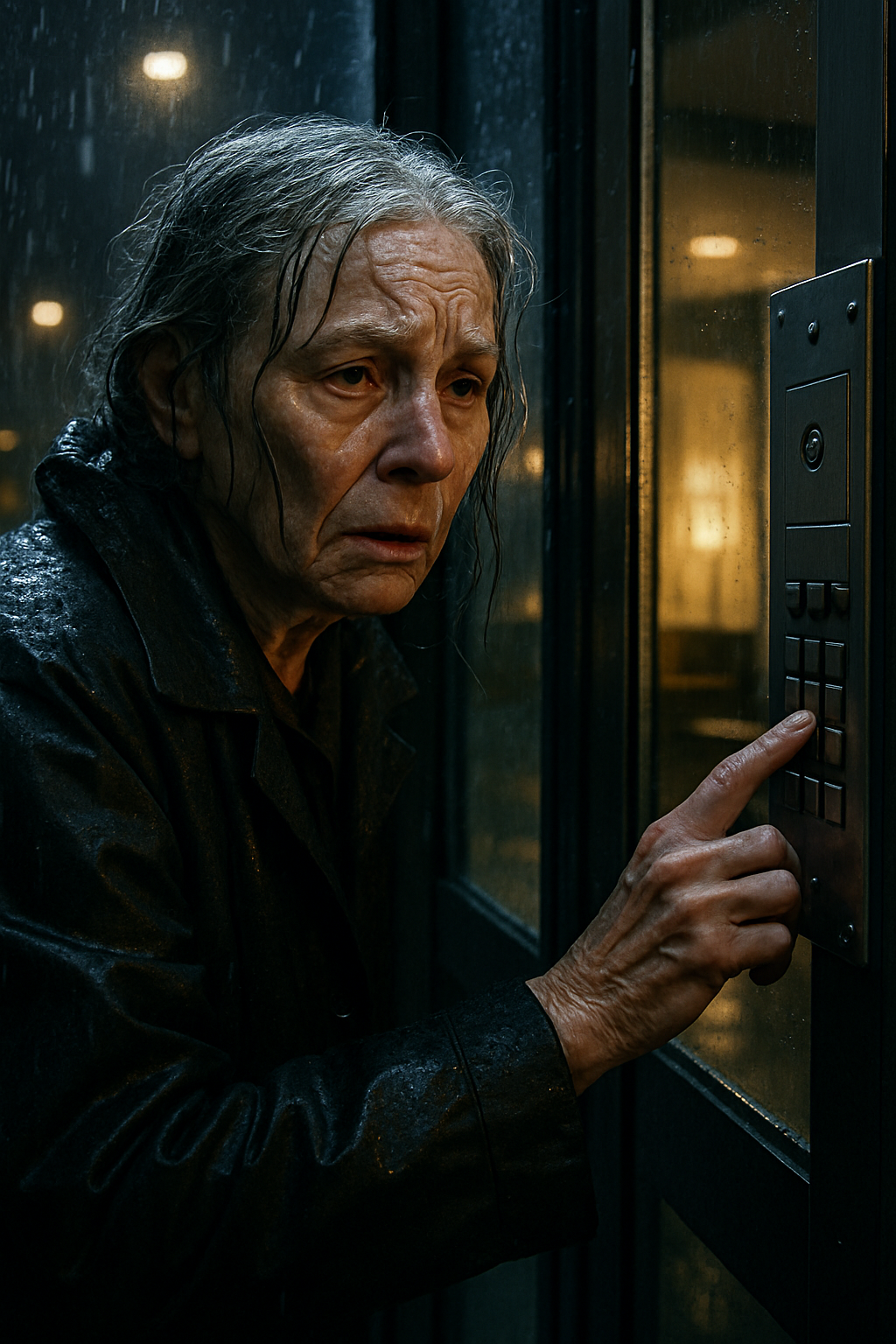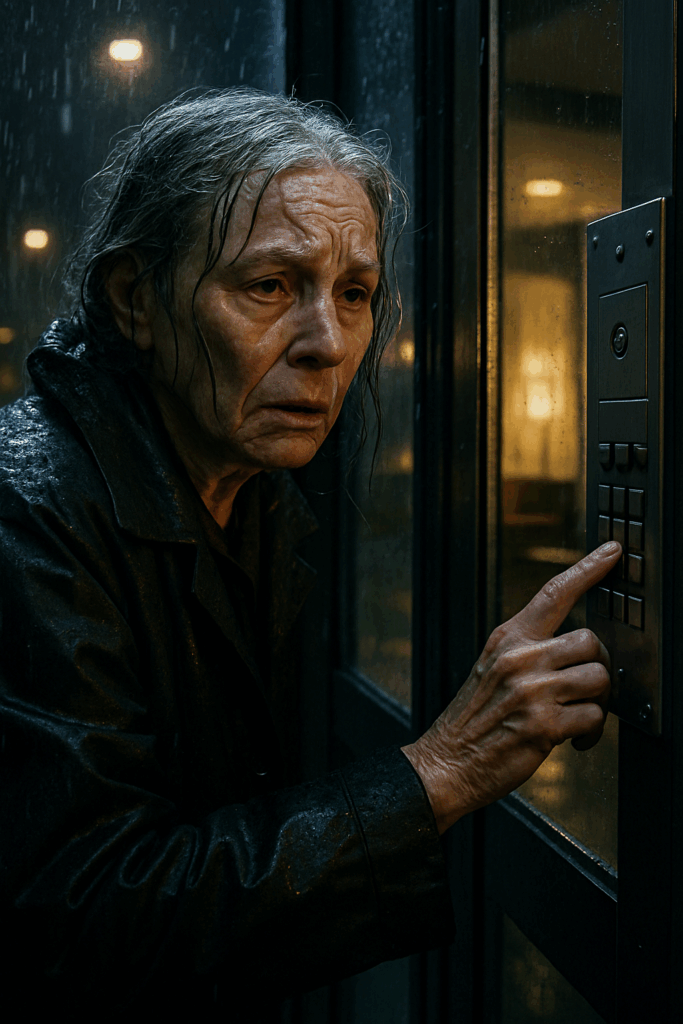The first thing that hit me after twenty years behind bars wasn’t freedom. It was the rain. It fell heavy over the city — a cold, metallic downpour that blurred the skyline of Chicago into streaks of gray. I stood on the sidewalk across from the shimmering glass towers of Lakeview Heights, where my daughter now lived.
Her name was Isabel Turner. She was thirty-two, successful, poised — the kind of woman who looked like she’d never known hunger or fear. The kind of woman who couldn’t possibly be the child of someone like me.
I stared at the intercom panel, my hand trembling. My reflection in the glass looked older than I remembered — hair streaked white, skin marked with the ghosts of years that didn’t belong to me.
I pressed the button.
“Hello?”
Her voice came through, cool and unfamiliar.
“Isabel,” I whispered. “It’s me… your mother.”
There was a pause. A long one. Long enough for the rain to seep into my coat and down my spine.
Then, her voice returned — sharp as glass.
“What do you want?”
“I just got out today,” I said, forcing steadiness into my tone. “I wanted to see you. Just once.”
“You have some nerve,” she said. “You think you can just show up after twenty years? You’re a convicted murderer.”
The word sliced straight through me.
“I didn’t do it, Izzy,” I said softly. “I swear I didn’t.”
“Don’t call me that,” she snapped. “You lost the right to say my name like that.”
A lump rose in my throat. “Please. Just five minutes. I don’t want anything. I just— I just need to see you.”
“Do you even realize what it’s like to live with your shadow?” she said, voice breaking for the first time. “Every time someone googles me, your name comes up. My coworkers know. My friends know. You destroyed my life before it even started.”
“Isabel…”
But the line went dead.
And with it, whatever remained of my heart.

PART I — The Night Everything Fell Apart
Before I became the woman everyone called a killer, I was Eleanor Pierce, a nurse at St. Matthew’s Medical Center. I had one daughter, a husband who drank too much, and a reputation for working double shifts to pay for Isabel’s schooling.
I wasn’t perfect. But I was good at what I did.
Until that night.
My patient was Daniel Crowe, a wealthy businessman admitted after a car crash. He was stable. He was expected to recover. But at 2:17 a.m., the monitors flatlined.
The next morning, detectives came to my house. They found traces of a cardiac depressant in his system — a drug that wasn’t prescribed, and one that came from my locked cabinet.
The syringe had my fingerprints.
I told them I was innocent. That I’d gone home early that night, that another nurse, Dr. Marcus Hale, had taken over. But Dr. Hale denied it. Said I was lying.
The hospital sided with him. The jury did too.
They said I’d stolen from the hospital — that I’d killed for money, or spite, or both.
And when I looked into the crowd at my trial, I saw my daughter’s face — pale, frightened — as they led me away in cuffs.
That image haunted me for two decades.
PART II — The Weight of Forgotten Years
Prison is like living inside your own shadow.
You become smaller every day, until you forget who you were before they caged you.
When I finally got out, I had no family, no home, and nowhere to go. The world had moved on. Technology, people, even the skyline — all unrecognizable.
The only place that would hire me was Crestview Nursing Home, an underfunded facility for the elderly on the outskirts of the city.
I didn’t mind. I’d spent years taking care of people who didn’t see me as human. Caring for the forgotten felt right.
That’s where I met Walter Briggs — an old man in Room 104. He rarely spoke, except when muttering to someone only he could see.
Until one night.
I was wiping down his bedside table when he said, “You were there. At St. Matthew’s.”
I froze. “What did you say?”
He turned his head, his eyes sharp and startlingly lucid. “You’re Eleanor Pierce. The nurse they said killed that Crowe fellow. I remember the night.”
My blood turned to ice. “How… how do you know that?”
He coughed, reaching for my hand. “Because I was there. I was the hospital’s night custodian. I saw who really did it.”
I felt my knees weaken. “Who?”
He stared at me for a long time. “Dr. Hale. The golden boy. He slipped something into the IV after you left. I thought it was routine. Until I heard the alarms.”
I grabbed his hand. “Why didn’t you tell anyone?”
“I did. I told security. The next day, I was fired. They said I was confused. Two weeks later, someone left an envelope of cash under my door. I kept quiet. For twenty years.”
Tears filled my eyes. “Do you have any proof?”
He nodded weakly. “In my locker. Key’s under the bed.”
I found the small metal key taped beneath the frame. My hands shook as I opened his locker. Inside was a sealed envelope, yellowed with age, marked ‘Insurance.’
Inside were photos, signed incident logs, and a letter — written by Walter — detailing everything.
I looked up to thank him, but his eyes had closed.
He was gone.
PART III — The Fight for the Truth
I took the evidence to the district attorney’s office the next morning. They were skeptical, at first. But after comparing signatures and timestamps, they reopened the case.
Weeks passed. I barely slept. I couldn’t eat. Every knock on the door made my heart leap.
Then came the call.
“Ms. Pierce,” the prosecutor said. “We’ve confirmed everything. The real perpetrator fled to Europe shortly after your conviction. Dr. Hale. We’ve filed for your exoneration. You’re officially cleared.”
For a moment, I couldn’t speak. The phone trembled in my hand.
Twenty years. Twenty years of shame, of being spat on, of praying for a miracle — and finally, it was here.
But miracles don’t undo scars.
I had my freedom, but not my daughter.
PART IV — The Door That Finally Opened
I wrote Isabel a letter — not to beg, not to justify, just to tell her the truth.
I included the article about my exoneration. And at the bottom, I wrote:
“You don’t have to forgive me. Just know I never stopped loving you.”
Two weeks later, there was a knock at my door.
I opened it — and there she was.
Isabel.
Her hair was tied back, her eyes red-rimmed but beautiful — the same eyes I once wiped tears from when she scraped her knees.
She didn’t speak for a moment. Then, softly:
“They said you were innocent.”
I nodded.
She bit her lip. “I didn’t want to believe you were guilty. But everyone said…” Her voice cracked. “I was just a kid. I didn’t know who to trust.”
I reached out, but stopped myself. “You don’t owe me anything.”
She stepped forward. “Maybe not. But I think I owe you dinner.”
That night, she brought me to her apartment — the same one where she’d shut me out weeks earlier. The air was thick with something unspoken, fragile but real.
We sat across from each other in her pristine kitchen, two strangers trying to remember how to be family.
“Do you still hate the rain?” she asked suddenly.
I smiled faintly. “I never hated it. It just reminded me of the day I lost everything.”
She reached for my hand. “Maybe now it can remind you of the day you got it back.”
PART V — The Last Confession
Months later, I visited Walter Briggs’ grave.
I brought him lilies. The headstone was simple, unmarked except for his name.
I knelt down and whispered, “Thank you. You saved my life.”
But as I placed the flowers, a man approached — middle-aged, expensive coat, carrying a briefcase.
“Mrs. Pierce?” he said quietly. “I’m Walter’s nephew. He left something for you.”
He handed me a small brown envelope. Inside was a letter.
“Eleanor,
If you’re reading this, it means the truth finally came out. I’m sorry it took me so long. I was a coward. But I hope this gives you peace.
There’s one more thing you should know — Dr. Hale didn’t act alone. Someone paid him. Someone wanted Daniel Crowe dead. Look for the name on the offshore accounts. You’ll find it.
— Walter.”
I froze. My hands trembled as I unfolded the attached document. A list of wire transfers, names… and one stood out.
Nathan Crowe. The victim’s son.
The truth wasn’t over. It had only begun. It’s been two years since my exoneration. Isabel visits every week now, often with her little boy — my grandson, Eli.
Sometimes, when it rains, we sit by the window together, sipping cocoa. She tells me about her job, her friends, her fears. And sometimes, she still cries — not from pain, but from release.
As for me, I’ve learned something in these late years of my life: freedom isn’t a door that opens. It’s a choice you make every day — to let go, to forgive, to live.
I still visit Walter’s grave. And every time I do, I whisper the same words:
“You gave me my daughter back. You gave me my life back. Thank you.”
The truth can be buried for twenty years. But it doesn’t die. It waits — quietly, patiently — until someone brave enough digs it up. And when it rains in Chicago, I don’t hide anymore. I lift my face to the sky and let it wash everything clean.


